What does physical activity do for your health?
Robina 7 Day Doctors and Acupuncture recommends this article.
We all know that exercise is meant to be good for us, and we’re often encouraged to be more active. But how exactly does activity affect our bodies?
13 volunteers underwent a series of tests to measure their health. This included tests for heart rate, blood pressure, aerobic capacity, blood sugar levels, arterial fitness.
10,000 steps a day is what we should aim for . It’s not scientifically calculated – so what effect did it have on our volunteers’ health?
The results
Changes were seen amongst all volunteers in two key areas. Their cardiovascular health (how their heart, lungs and blood vessels work together to transport oxygen to their muscles) and their blood sugar levels.

After the inactive period (3000 steps per day) each volunteer suffered a drop in their cardiovascular health (as measured by VO2 max). This is often seen as an indicator of general health and even fitness. Everyone suffered a decline of at least 5% – with at least one person suffering a drop of 15% in just 10 days.
Across the group, there was a drop in their ability to regulate their blood sugar levels after the evening meal. Blood sugar levels went higher and stayed higher for longer.
After the active period (10,000 steps per day) all volunteers saw improvements in both their cardiovascular health and their blood sugar levels. But they did not regain their baseline levels in the 10 days period.
What this means
The study suggests that inactivity could put people at risk because it causes a decline in their cardiovascular health and ability to control blood sugar levels.
back to home page: www.doctorbulkbill.com.au
Facebook: www.facebook.com/Robina7DayDoctorsandAcupunctureBulkBill
